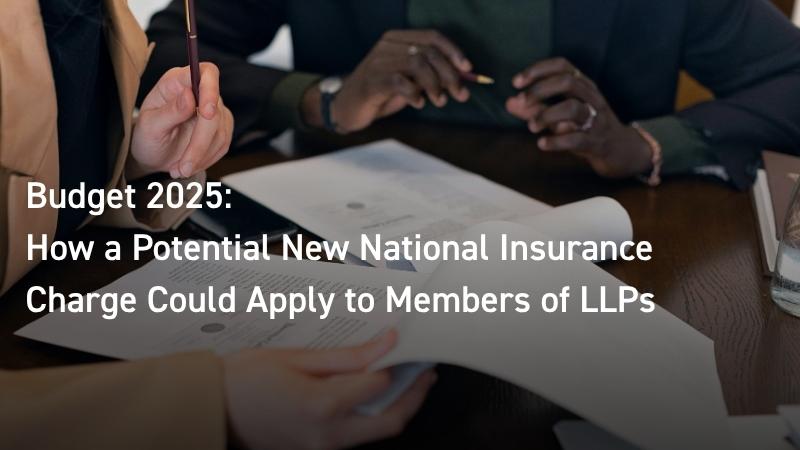
Recent press reports have suggested that the Autumn Budget, set for 26 November 2025, may include the introduction of employer’s national insurance (NI) on Limited Liability Partnerships (LLPs).
Such a move would represent a significant shift in the taxation of members of LLPs.
The idea has been proposed by influential think tanks including Centax and The Resolution Foundation, with their reports providing some indication as to how the additional NI could be charged if such a policy were implemented by the Chancellor.
What are LLPs and why do partners not pay Employer’s NI?
LLPs are a popular business structure, often used by professional services firms such as law firms, accountancy practices, and consultancy businesses. They are also used by GP practices, but there has been some speculation suggesting that Doctors would be exempt from this charge.
The partners of an LLP benefit from shared limited liability, but they are taxed on the profits of the business rather than the money they draw from it. Provided they do not fall foul of existing anti-avoidance legislation, they are not taxed as employees but as a collection of self-employed individuals running their own business. They do not, therefore, pay Employer’s NI, which is the charge that an employer pays on an employee’s salary (currently at a rate of 15%).
Employer’s NI is unrelated to primary Class 1 and Class 4 NI, which is paid by employees and traders/partners respectively.
How could the NI charge apply?
It is worth reiterating that there has been no confirmation that this NI charge will be included in the Autumn Budget, and similarly no details given about how it would work in practice.
However, based on the think tank reports, one way the charge could be applied is to effectively add an additional NI charge on a partners’ taxable profits based on the marginal rate that would otherwise have applied. The reason the rate is unlikely to be levied as a flat 15% is:
This is illustrated below:
| 20% taxpayer | 40% taxpayer | 45% taxpayer | ||||
| Example taxable profit | £50,000 | £100,000 | £200,000 | |||
| Employer’s NI | (£6,522) | (£13,043) | (£26,087) | |||
| Net profit | £43,478 | £86,957 | £173,913 | |||
| Employee’s tax and NI | (£8,036) | (£25,210) | (£69,199) | |||
| Net pay | £35,442 | £61,747 | £104,714 | |||
| Increase in marginal tax rate | 9.60% | 7.60% | 6.90% | |||
For the partner on £200,000, who is currently taxed at a marginal rate of 47% (45% tax plus 2% NI), their marginal tax rate increases to nearly 54%.
Reaction to date; balancing fairness and risk
Some commentators have argued that this policy would ensure fairness in effective tax rates between employees and partners, whilst reducing the potential for tax avoidance where employees are made partners primarily to save on employer’s NI.
Others have criticised the policy for failing to recognise that partners’ taxable profits are often much higher than the amount they are able to draw from the business (i.e. higher than their effective pay) due to working capital requirements in the business. Furthermore, it does not account for the fact that partners are often materially invested in a business by introducing capital into it, akin to shareholders who benefit from no NI charge on the withdrawal of profits via dividends.
There are other arguments for and against but equally important is the potential behavioural responses to this policy. For example, there are concerns that the additional NI cost will deter partners from trying to earn over a certain threshold, that costs will simply be passed on to clients, that staff costs will be cut, or that businesses will incorporate such that going forwards they operate through a limited company rather than an LLP.
With the Autumn Budget looming, our experts are on hand to advise on the tax position of any changes and business structures to support LLPs make informed decisions.
We’d love to hear from you. To book an appointment or to find out more about our services: